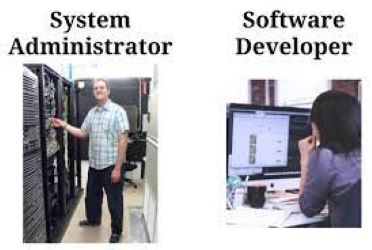System Administrator vs. Developer: Exploring Career Paths in IT
The field of Information Technology (IT) offers a diverse range of career paths, each catering to different skill sets and interests. Two prominent roles in the IT industry are System Administrators and Developers. While both roles contribute to the functioning of technology systems, they have distinct responsibilities, skill requirements, and career trajectories. In this article, we’ll explore the differences and similarities between these roles to help you make an informed decision about your IT career path.
System Administrator: Keeping the IT Infrastructure Running
Responsibilities: System administrators are responsible for the maintenance, configuration, and reliable operation of an organization’s IT infrastructure. This includes servers, networks, databases, and other technology systems. They ensure that hardware and software components run smoothly, manage user accounts, perform system backups, and troubleshoot technical issues.
Skill Set:
- Technical Proficiency: System administrators need a strong foundation in operating systems (Windows, Linux, etc.), networking protocols, and server management.
- Troubleshooting: They should excel at diagnosing and resolving technical issues promptly.
- Security Awareness: System administrators play a critical role in ensuring data security and implementing cybersecurity measures.
- Automation: Proficiency in scripting languages allows administrators to automate routine tasks and improve efficiency.
- Project Management: Managing upgrades, migrations, and system deployments requires project management skills.
- Adaptability: Rapid technological advancements demand flexibility to learn and adapt to new tools and techniques.
Career Path: System administrators can progress to roles such as Senior System Administrator, Network Engineer, Cloud Administrator, or even move into IT management positions. The role offers stability and a sense of ownership over the organization’s technology infrastructure.
Essential Skills for System Administrators: Navigating the IT Landscape
Developer: Crafting Software Solutions
Responsibilities: Developers, also known as software developers or programmers, create applications, websites, and software solutions. They write code, design user interfaces, collaborate on project requirements, and work closely with clients to meet their software needs.
Skill Set:
- Programming Languages: Developers specialize in programming languages such as Java, Python, JavaScript, and more.
- Problem Solving: They excel at breaking down complex problems into manageable components and designing effective solutions.
- Coding and Debugging: Writing clean, efficient, and bug-free code is a primary skill for developers.
- Creativity: Developers innovate to create user-friendly applications and enhance user experiences.
- Version Control: Proficiency in using version control systems like Git is crucial for collaborative coding.
- Continuous Learning: Developers stay updated with programming languages, frameworks, and industry trends.
Career Path: Developers have a range of career paths, including Front-end Developer, Back-end Developer, Full-stack Developer, Mobile App Developer, and more. As they gain experience, they can become Technical Leads, Software Architects, or pursue roles in areas such as DevOps or AI development.
Choosing Your Path
When deciding between a career as a System Administrator or a Developer, consider your strengths, interests, and long-term goals. If you enjoy problem-solving, have a knack for troubleshooting, and thrive in a dynamic environment, system administration might be your calling. On the other hand, if you’re passionate about coding, enjoy crafting software solutions, and want to be at the forefront of technological innovation, a career in development could be the right fit.
It’s important to note that the IT industry often encourages cross-functional skills. Some system administrators learn coding and become DevOps engineers, while developers gain expertise in server management to become Full-stack Developers. Whichever path you choose, ongoing learning and adaptability will be key to thriving in the dynamic and ever-evolving world of IT. Whether you’re keeping systems running smoothly or crafting the software that powers them, both roles contribute significantly to the technology-driven landscape we live in.

